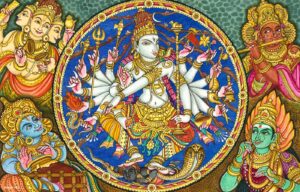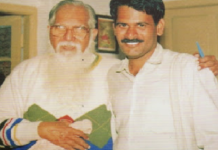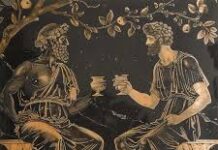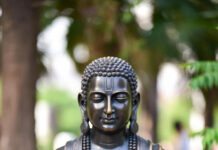
For the past month, many readers have been emailing me asking this question: Is there such a thing as Hinduism? Many of them are youngsters who are learners of modern education with a bit of interest in culture and tradition. But all they follow are social media handles and the rants of politicians.
I replied to them with annoyance. “In the entire world, Hindus are unique in a way. They take lessons about their religion from those who are atheists of the religion and from those who have vowed to destroy Hindu way of life”.
Just give it a thought. There have been innumerable philosophers and sages here. There are umpteen number of books available for one to read. Nobody even glances at them. But they listen to the hateful speeches given by people who have no basic knowledge about the history of Hindu tradition or its philosophy and form an understanding of what Hinduism is. No religion in the world suffers such a pathetic state.
Thought is created by assimilating texts along with an understanding of history. Chatting through WhatsApp and Facebook and getting to know a few lines of facts, is not only ignorance, but an idiocy of spreading ignorance.
Those who pose the question of whether there is such a thing as Hinduism are mostly ordinary politicians who do not know cultural history or the way religions work.
Coming to the question… Is there such a thing as Hinduism? Was there Hinduism a thousand years ago?
First things first. What we call religion today is just an idea. Usually, the uneducated believe that all the ideas we talk about today have existed all along. But the truth is not so. Many of the ideas we talk about today were developed within three centuries. For example, democracy, individual rights, etc.
The history of how each of these ideas evolved, gradually gained strength, and spread throughout the world is well documented. It is impossible to talk about the question in hand without knowing a little about that history.
Religion is such an idea. It originated in Europe from the sixteenth century CE. The word religion has its origin from the French word religiō. Until the seventeenth century, it meant ‘worshiping the sacred’.
During the sixteenth century CE, many Christian sects arose in Europe in opposition to the Catholic Church. They are called Protestant Christianity, or Reformed Christianity. The word religion came into use to refer to those Christian sects. Over time, it came to mean what we call religion today.
That meaning is entirely based on the Christian faith in Europe. That is what European scholars to this day mean by religion.
According to their metaphor, a religion has four aspects.
- The deity or deities to be worshiped
- Practices of Worship and Places of Worship
- The philosophies of worship and the sacred scriptures presenting them
- The administrative body that controls worship,
It is religion only if these four are present.
Europeans began trading around the world starting from the seventeenth century. Then they captured and ruled the countries. We call it colonialism.
Europeans saw the cults in the places they visited and defined them as religion. That is how they identified the religions in India as Hinduism, Buddhism, Jainism, and Sikhism.
If so, what is the name of these spiritual traditions that were already here?
Earlier spiritual traditions and cults did not call themselves religions. Islam called itself ‘The Way’. Buddhist tradition, Hindu tradition, and Jain tradition presented themselves as ‘Dharma’. Even the Catholic Christian tradition referred to itself as ‘Order’. Modern scholars later gave the category of religion.
So how did the word religion come about? The word religion was already treated in the Hindu tradition in the sense of’strong take’ or ‘principle’. It has the same meaning as ‘Samayam’ in Tamil. One can even say ‘Drinking coffee in the morning is my religion’.
There were so many such religions here. All the principles within a philosophical tradition are called religion. That means Vedanta is a religion. Within Vedanta, those who believe that Brahman transforms into the universe belong to the Vivartavada religion. There are many such religions within Buddhism and Jainism.
Among the generalists, those who maintained that truth was mere logic were called rationalists. Those who believed that only worldly pleasures were true belonged to a religion called ‘Charvaka’.
In other words, until the eighteenth century, the word religion did not have the same connotation here as in Europe.
It was the English administrators who defined the cults as religion in India. Then it was enshrined in law and spread through newspapers.
When the word’religion’, which referred to the practices of worship of Europeans, was translated to Indian languages by our pioneers, it was referred to as’religion’ ‘or’samayam’ as the equivalent. This is how we came to know the word ‘religion’ in its present meaning.
This is how we also started to believe that there is such a thing as Hinduism. We started claiming that the religion Hinduism has been prevalent in the land for thousands of years. Many scholars and pioneers have condemned and warned against calling the practice of worship and spirituality here as religion.
What has existed here for thousands of years is not a religion as Europeans define it. What was here was called Dharma. Hinduism, Buddhism and Jainism are all three dharmas.
Dharma is different and religion is different. The above mentioned four essentials of religion are not present in the tradition of dharma. So this is the answer to the first question. Is there a religion called Hinduism? No. What was and is here is only Hindu Dharma.
Jeyamohan












